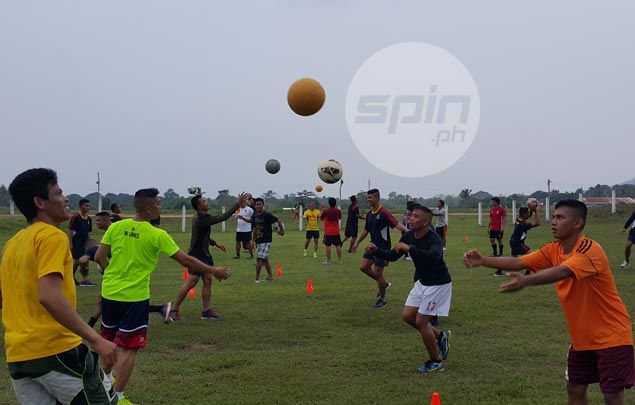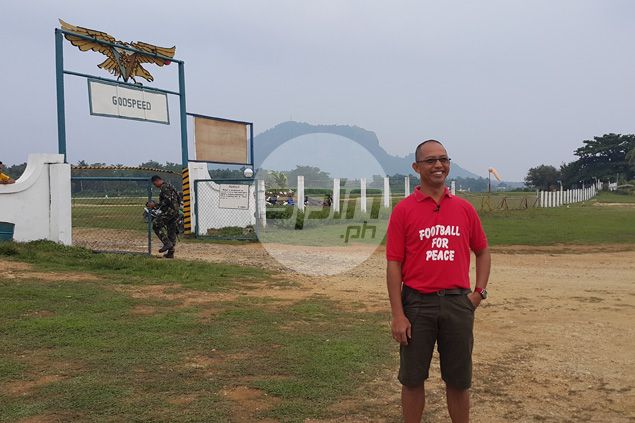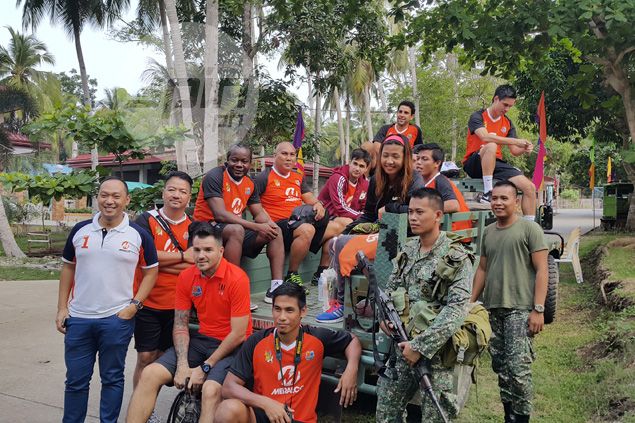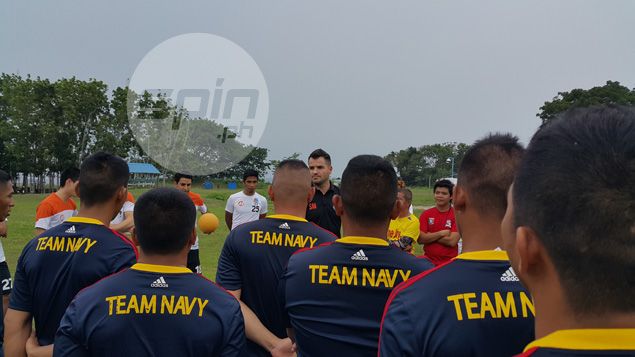
Meralco Sparks players and coaches give a clinic to Marines who in turn will be tasked to introduce the Beautiful Game to kids in war-torn areas of Mindanao. Rhoel Fernandez
BONGAO, Tawi Tawi - Riding in the back of a Mitsubishi
pickup truck speeding on a scenic road along the coastline of Bongao Island ,
Loyola Meralco coach Simon McMenemy was a picture of bliss, considering he was
in the middle of one of the Philippines
The 37-year old Scot was sharing to SPIN.ph some of his experiences in the
Indonesian city of Banda Aceh
“There’s a reverence there, a sense that something very terrible
happened. In the middle of a road there was a ship that was cut in half,” he
said. Asked why he preferred to ride out in the open, the former Azkals coach,
who would wave and smile to everyone we passed by, explained it was the best
way to know a place and its people.
A few minutes later, we arrived at TOG Sultaw, a small Air
Force camp bordered by the Sulu Sea and Sanga-Sanga Airport
Football for Peace
Football for Peace is the brainchild of Lieutenant Colonel
Stephen Cabanlet. Outside his uniform, it’s easy to mistake the soft-spoken
marine for a high school teacher.
When the Azkals rose to national prominence in 2010 (with
the help of then coach McMenemy), Cabanlet, who was deployed with the 3rd
Marine Battalion in Sulu, decided to use the sudden popularity of football as a
medium that his men could use to win the hearts and minds of the children in
their area of operations, a hotbed of an Islamic insurgency over the last
several decades.
“Madaming nagtataka bakit football. Kahit ako minsan
nagtatanong sa saking sarili. Minsan may mga pagkakataong binibigay sa atin na
nagiging susi na puede mong gamiting pambukas ng oportunidad - either sa peace
or sa (personal) success,” Cabanlet said.
In 2011, Cabanlet used football as a weapon for his men to
achieve peace. What began as an pastime during off-duty hours drew curious
children to their camp and the marines used it as an opportunity to establish
bonds by teaching and playing with young people who practically grew up in a
culture that guns are considered status symbols.
“Kapag nakamulatan mo ay baril, dala-dala mo na iyan, iyun
na ang gusto mong hawakan. Sa amin dito, imbis na baril ang ipapakikita namin
sa mga bata na hawak-hawak ng mga marines, bola ang simbolo para iwas ang
pag-iisip ng mga bata sa mga baril na parating nakikita nila sa araw-araw.”

He noted that the children aren’t their enemies and that
what they are trying to change is their mindset and along the way, provide some
semblance of discipline to their lives, particularly how they value their
studies and treat other people.
When the marines began Football For Peace, their objectives
were pretty simple — to provide a venue for kids to become kids again and to
open their young eyes that change is possible despite dire circumstances in a
conflict area.
“Papalaruin ka namin ng football dahil gusto naming ikaw
magbago. Papalaruin ka namin ng football kasi gusto ka naming maging katuwang
para sa kapayapaan. Papalaruin ka namin ng football para mabago natin ang
inyong komyunidad,” the colonel said.
Cabanlet said he realized that football - and sports for
that matter - can unite Filipinos.
“May Gilas na tayo, lumalaban na tayo sa volleyball at sa
football. So dito ang bola —anumang sports o laro na ating papasukan — patungo
tayo sa pagbabago.”
“Kung nangarap tayo ng pagbabago, saan ang simula? Sabi nga
nila sa sarili. Tayong matatanda sarado na ang pag-iisip. Kaya ang target
naming ang mga bata — ito ang bola. Ino-offer namin ay pagbabago. Bawat sipa mo
ay pangarap, bawat sipa mo ay pagbabago, bawat goal mo ay may katapat na
disiplina. Iyun ang binibigay namin sa mga bata,” Cabanlet pointed out.
Cabanlet’s faith in his fellow men was strengthened during
the Zamboanga Siege where his battalion was involved in the fierce fighting. He
was unable to be with his wife who was battling leukemia at the time and also
did not have the money for her treatment. A newspaper reporter found out about
his situation and wrote a story. To Cabanlet's surprise and everlasting
gratitude, people suddenly chipped in and paid for the hospital bills.
One Meralco Foundation president Jeff Tarayao said it was
McMenemy who insisted on holding a clinic in Mindanao .
So in the last week of September and for the first time ever, a team from a
professional sports league held a clinic in Tawi Tawi.
When McMenemy returned after a personal reconnaissance trip
last August, the coach talked to the team, told them it was safe to go and asked
for volunteers.
Answering the call were players James Younghusband, Simon
Greatwich, Jake Morallo, Yves Ashime, Adam Thomas Mitter, Anthony Putrus
Schnell, and Ricardo Padilla. Assisting him were assistant coach Gil Talavera
and former Maldita player Isabella Fernando.

Ashime, the veteran defender from Cameroon Brazil
From the time they landed in Bongao, the Sparks
With ‘The Holy Mountain’ of Bud Bongao as a backdrop and the
roar of a C-130 Hercules taking off, the Sparks spent Day One training 40
marines, sailors and airmen inside the air force camp just beside the
runway.
The Sparks
The training was kept simple and fun and was meant to be
easily remembered by the marines and soldiers who would then impart it to the
children when their time came. After the session, several excited townspeople
who were watching from the sidelines braved the sidelines and asked the players
for selfies, with Younghusband being the favorite and the target of questions
of where elder brother Phil was.
'Kids here are fearless'
Day 2 was dedicated to the “One Day, One Goal Football Festival”
where the Sparks
The Sparks Manila
“The kids here are fearless. We were all talking about that
yesterday. During one of the games, one of the kids got a big cut on his face.
The keeper was coming for the ball and normally you stop. The kid still went
for it and got caught at the foot of the 'keeper and blood was coming out.
That’s how we noticed first that they were really fearless. I guess it’s their
way of life. They were really trained for worse e,” noted Belay Fernando.
Undeterred by the lack of facilities and the late start,
McMenemy was in his element and played both coach and entertainer, an advantage
from his community outreach days. You could hear his brogue from one end of the
field to the other.
Nothing, however, could prepare the coach for what would
happen in the latter part of the clinic. Impressed by one of the kids who was
sharing a pair of beat-up cleats with another teammate, McMenemy decided to
open a large purple suitcase he had been lugging everywhere throughout the
trip. Inside were several pairs of soccer shoes and football jerseys that were
donated by friends and even foes. When the coach handed a pair of shoes to the
surprised boy, the look on the child’s grateful face from a gesture so
unexpected became too much for the normally cool and taciturn McMenemy who
later admitted that he had to turn away or risk losing his emotions and
embarrass them both.
“That’s the job. I love football. I love the coaching. I
love the professional side. But the bit that gets me emotional, that soothes my
soul - you don’t get to see me emotional when it comes to professional football
— but the bit that gets to me is doing this,” he later admitted.

Eye-opening experience
I had the chance to talk to many of the Sparks
On the return flight to Zamboanga, the former Maldita shared
that the clinic was an “eye opening” experience for her and expressed
admiration and respect for the marines and what they do.
“The best part of the trip for me was when we got to speak
to the marines. They are in the frontlines and they really take this project
seriously,” she told SPIN.ph.
In between clinics, she said the marines would talk to them
and share their experiences from places such as Sulu, Misamis and Basilan.
“During combat operations, the marines practically fight
with these children’s parents and unless things change, they will have to fight
these kids in the future.”
“If the kids see them they will remember the marines next
time they come back. The marines are using football to change the deadly cycle
and the way these kids view life,” she added.
One of the organizers told the Sparks
Such stories from the marines provided the Sparks
“I understood why they were so fearless in playing and so
determined. They’re different from the typical kids. They want to find a way
out. It’s difficult to also get out of there but this is really basically
getting out of a life or death situation.”
In a place of conflict such as Tawi Tawi, soldiers have a “you or me” mindset, a mentality, Belay believes, that has been mirrored by the children.
In a place of conflict such as Tawi Tawi, soldiers have a “you or me” mindset, a mentality, Belay believes, that has been mirrored by the children.
“They had one kid. This is kind of sad. They keep track of
them in the program. He was with Abu Sayyaf already and he was only six or
seven years old. He decided to apply for the Football for Peace. And then
he would still go for the training. He’d go back and he’d go home. He lived
with his grandfather kasi wala na yung parents. He’d go to the training then go
home and when he started with Football for Peace he stopped going (to the ASG)
and completely stopped. They found out, went to the grandfather’s house, asked
for the kid, got him back and shot him twice (and he was) gone.”
In a deadly conflict that has spanned decades and has yet to
see its last battlefield, the Marines, with the Football for Peace, are hoping
that they win it by bringing the children of who they face, to a different
field.

No comments:
Post a Comment
Note: Only a member of this blog may post a comment.